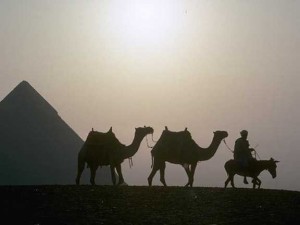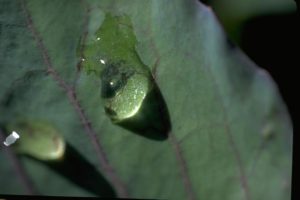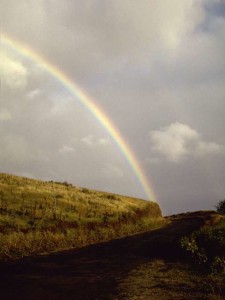 When I was ten years old, crossing a Jordanian desert with my travel-writing parents, I experienced overwhelming thirst. Water was rationed during the interminable drive, and our guide told me I’d have to wait for any quenching to happen. When we finally arrived at a hot, mid-way oasis where there happened to be a well, he squirted water at my face from a wineskin, only a few drops of which went into my mouth. Everyone laughed.
When I was ten years old, crossing a Jordanian desert with my travel-writing parents, I experienced overwhelming thirst. Water was rationed during the interminable drive, and our guide told me I’d have to wait for any quenching to happen. When we finally arrived at a hot, mid-way oasis where there happened to be a well, he squirted water at my face from a wineskin, only a few drops of which went into my mouth. Everyone laughed.
But being thirsty is not funny. Even though I know I was not in any real danger, to this day I can’t bear being thirsty. It scares me. Ever since that time, I’ve felt a special gratitude toward water. I feel fortunate to live in a mountainous, rainy region, where a deep well provides us with fresh, mineral-rich, plentiful water whenever we want it.
Like most teenagers, my friends and I used to have animated conversations about how every drop of water we drank had at one time or another been George Washington’s tears, Napoleon’s brandy, or Plato’s pee, since there’s a finite amount of water on the planet.
 It’s true: water on our planet remains constant over time. It’s only the places it finds its way to—like ice, clouds, our bodies, oceans, and rivers—that vary. The cycle of every drop of water we drink comes from a continuous movement of water above, on, and below the surface of the earth. Water metamorphoses into liquid, solid ice, and gas or vapor, moving from one state to another, from river to ocean, ocean to sky, evaporating, condensing, precipitating, freezing, and flowing.
It’s true: water on our planet remains constant over time. It’s only the places it finds its way to—like ice, clouds, our bodies, oceans, and rivers—that vary. The cycle of every drop of water we drink comes from a continuous movement of water above, on, and below the surface of the earth. Water metamorphoses into liquid, solid ice, and gas or vapor, moving from one state to another, from river to ocean, ocean to sky, evaporating, condensing, precipitating, freezing, and flowing.
Our water cycle is essential for the maintenance of most life and ecosystems on the planet. There is little in our lives that is as precious as water. More valuable than diamonds, gold, real estate, food … anything, in fact. Water, like air, is at the core of our existence. But unless you happen to be crossing a desert where water is scarce, you may not pay much attention to this magnificence.
 Recently, I fell upon a symposium hosted by Tambra Harck. She suggested a lovely ritual of thanking and loving your water before you drink it. It reminded me of Masaru Emoto’s extraordinary experiments, in which water that was spoken to in kind words and voice, crystalized in harmonious, exquisite, symmetrical patterns. When water was spoken to harshly and critically, the crystals were erratic, jagged, irregular.
Recently, I fell upon a symposium hosted by Tambra Harck. She suggested a lovely ritual of thanking and loving your water before you drink it. It reminded me of Masaru Emoto’s extraordinary experiments, in which water that was spoken to in kind words and voice, crystalized in harmonious, exquisite, symmetrical patterns. When water was spoken to harshly and critically, the crystals were erratic, jagged, irregular.
Try it—see if the water tastes different or feels different if you speak to it lovingly before you drink it.
 I think a water ritual like this one makes a difference: We are drinking a lake, a cloud, his swamp, your tear … every drop has been through every cycle imaginable, and by loving it, we purify, honor, and send it on its way in a more beloved state, thus affecting the whole world.
I think a water ritual like this one makes a difference: We are drinking a lake, a cloud, his swamp, your tear … every drop has been through every cycle imaginable, and by loving it, we purify, honor, and send it on its way in a more beloved state, thus affecting the whole world.
Here lies one whose words were writ in water.
John Keats
